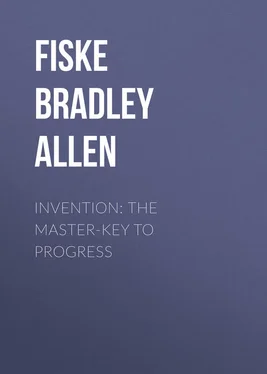Bradley Fiske - Invention - The Master-key to Progress
Здесь есть возможность читать онлайн «Bradley Fiske - Invention - The Master-key to Progress» — ознакомительный отрывок электронной книги совершенно бесплатно, а после прочтения отрывка купить полную версию. В некоторых случаях можно слушать аудио, скачать через торрент в формате fb2 и присутствует краткое содержание. Жанр: foreign_antique, foreign_prose, на английском языке. Описание произведения, (предисловие) а так же отзывы посетителей доступны на портале библиотеки ЛибКат.
- Название:Invention: The Master-key to Progress
- Автор:
- Жанр:
- Год:неизвестен
- ISBN:нет данных
- Рейтинг книги:4 / 5. Голосов: 1
-
Избранное:Добавить в избранное
- Отзывы:
-
Ваша оценка:
- 80
- 1
- 2
- 3
- 4
- 5
Invention: The Master-key to Progress: краткое содержание, описание и аннотация
Предлагаем к чтению аннотацию, описание, краткое содержание или предисловие (зависит от того, что написал сам автор книги «Invention: The Master-key to Progress»). Если вы не нашли необходимую информацию о книге — напишите в комментариях, мы постараемся отыскать её.
Invention: The Master-key to Progress — читать онлайн ознакомительный отрывок
Ниже представлен текст книги, разбитый по страницам. Система сохранения места последней прочитанной страницы, позволяет с удобством читать онлайн бесплатно книгу «Invention: The Master-key to Progress», без необходимости каждый раз заново искать на чём Вы остановились. Поставьте закладку, и сможете в любой момент перейти на страницу, на которой закончили чтение.
Интервал:
Закладка:
As to influence on history, however, the influence of the material inventions has probably been the greater. Immaterial inventions might have been made in enormous numbers without of themselves affecting history greatly; but the material inventions have brought about most of the events that history describes; and without one material invention, that of writing, history could not exist at all. History is rather a narrative of men's deeds than of their thoughts; and their deeds have been directed largely by the implements which they had to do deeds with.
We must realize, of course, that the Greeks were much indebted to the Ægeans; for discoveries about the shores and islands of the Ægean Sea show that long before the advent of the Greeks they used tools and weapons of rough and then of polished stone, and later of copper and tin and bronze; that they lived on farms and in villages and cities, and were governed by monarchs who dwelt in palaces adorned with paintings and fine carvings, and filled with court gentlemen and ladies who wore jewelry and fine clothing. Exquisite pottery was used, decorated with taste and skill; ivory was carved and gems were engraved, and articles were made of silver and bronze and gold.
As early as the sixth century B. C., the Greeks made things more beautiful than had ever been made before. One almost feels like saying that the Greeks invented beauty. Such a declaration would be absurd of course: but it seems to be a fact that the Greeks had a conception of beauty that was wholly original with them, and that was not only finer than that which any other people had ever had before, but finer than any other people have had since. And not only did they have the conception, they had the ability to embody the conception in material forms that possessed a beauty higher than had ever been produced before, and higher (at least on the average) than have ever been produced in any other country since.
Looked at in this way, the production of a new and beautiful statue, painting or temple, seems to be an act of invention much like the formulation of a myth or the writing of a poem. In this sense, the Greeks were inventors, inventors of works of beauty that have existed as concrete material creations for centuries, and have exercised an enduring influence on the minds of men.
The influence of paintings, statues and temples is not so clear as that of material inventions, but more clear than that of myths and poems. They may be said to form a class midway between inventions of material appliances and inventions of immaterial thoughts and fancies. A beautiful painting or statue is a material object in the same sense as that in which a steam engine is; but its office is to stimulate the mind, as a poem does.
The first inventor of mechanical appliances, mentioned by name as such, was Dædalus of Athens. He was probably a mythical person. He was reputed to be the son or the grandson of Erectheus, a probably mythical king. He is credited with the invention of the saw, the gimlet, the plumb-line, the axe, the wedge, the lever, masts and sails and even of flying; – for he is said to have escaped from Crete to Sicily with artificial wings. The story of Dædalus, like that of many other mythological personages, is both interesting and irritating from the mixture of the very probable, the highly improbable, and the entirely impossible, in a jumble. But the story of Dædalus seems to make it probable that all the things which he is reported to have invented (except flying) were in use in Greece in prehistoric times.
As no records show to us that the inventions just enumerated (except masts and sails) had been invented elsewhere, we may feel justified in inferring that they were invented in Greece by Dædalus, or by some other man bearing a different name, – or by some other men. The name borne by the man is not important to us now; but it is important to realize that such brilliant and original inventions were made so long ago by a primeval people; especially since they were of a character somewhat different from those invented in Egypt and Asia which we have already noted. The invention of the gimlet seems the most brilliant and original of those just spoken of; and one marvels that it should have been invented at such a time; for the action of the gimlet was a little more complicated than that of even the balista or the catapult. It is true that the number of parts was less, that in fact there was only one part. But that part turned around in one plane, and advanced in another; it was less like anything that existed before than the catapult was like the sling, or the balista was like the cross-bow. There was no immediate forerunner of the gimlet. In other words, the mental jump needed to invent the gimlet was from a base of nothing that we can exactly specify.
A possible suggestion for the gimlet was the succession of inclined planes by which one mounted to the top of an Assyrian or Chaldean palace; these planes rising gradually on each of the four sides, so as to form together what might be called a square spiral. It is possible that a circular spiral may have been traced later around some cylindrical shaft or column, and given the first suggestion for the screw or gimlet. Of course, a gimlet is a kind of screw. The Greeks do not seem to have applied their inventiveness after the time of Dædalus to mechanical appliances, but to works of art and systems of religion and philosophy. One of their most important inventions may be said to be mid-way between: it consisted in adding vowels to the Phœnician alphabet and producing the basis of the Latin and succeeding alphabets. The Greeks were not naturally of a warlike disposition, and their peculiarly jealous temperament prevented the various states and cities from combining and forming a great nation. Their energetic character and great intellectuality saved them, however, when Darius, King of Persia, invaded Greece in 490 B. C.
By that time the Greeks had raised and trained an army of great excellence. No especial inventiveness seems to have been exercised, but the equipments of the men, their organization, their armor, their weapons and their discipline had been brought to a standard exceedingly high. All these advantages were needed; for the Persians were a warlike people, their King Darius was an ambitious and successful conqueror, and the number of Persians that invaded Greece was far greater than the number that Greece could raise to fight them.
Had the Greeks been destitute of invention they would have followed the most obvious course, that of shutting themselves up inside the protection of the walls of Athens. Had they done this, the Persians would have surrounded the city, shut them off from supplies from outside, and slowly but surely forced them to surrender.
But, on the insistent advice of Miltiades, the Greeks advanced to meet the Persians, leaving the shelter of their walls behind them. It may not seem to some that Miltiades made any invention in planning the campaign which he urged against much resistance, and which the Athenians finally carried out. Yet his mental action was one allied to that of making an invention; for his mind conceived a plan as a purely mental picture, then developed into a workable project, and then presented it as a concrete proposition. Later, when the hostile forces met on the low plain of Marathon, Miltiades rejected the obvious plan that an uninventive mind would have adopted. Instead of it, he invented the plan of weakening his center, strengthening his flanks, and departing from the usual custom of advancing slowly against the enemy, in favor of advancing on the run. The plan (invention) worked perfectly. The unsuspecting Persians broke through the center and pursued the fleeing Athenians to a rough ground; – only to be caught between the two flanks, like a nut in a nut-cracker, and crushed to pieces.
Читать дальшеИнтервал:
Закладка:
Похожие книги на «Invention: The Master-key to Progress»
Представляем Вашему вниманию похожие книги на «Invention: The Master-key to Progress» списком для выбора. Мы отобрали схожую по названию и смыслу литературу в надежде предоставить читателям больше вариантов отыскать новые, интересные, ещё непрочитанные произведения.
Обсуждение, отзывы о книге «Invention: The Master-key to Progress» и просто собственные мнения читателей. Оставьте ваши комментарии, напишите, что Вы думаете о произведении, его смысле или главных героях. Укажите что конкретно понравилось, а что нет, и почему Вы так считаете.












